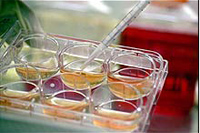
Scientists said it was the first stage to creating sections which can be used to repair damaged livers and even a full-size functioning version.
The creation of the mini-liver by scientists at Newcastle University involved taking stem cells – blank cells capable of developing into different types of tissue – from the umbilical cords of newborn babies.
The cells were then placed in a “bioreactor†developed by NASA that mimics the effects of weightlessness and allows them to multiply rapidly.
Using hormones and chemicals, the stem cells are then coaxed into turning into liver tissue.
While other research teams have created liver tissue from stem cells taken from embryos, the Newcastle University team are the first to have done it using cord blood stem cells.
This technique is considered more ethically acceptable than using embryonic stem cells because the embryo dies in the process.
In its current form, use of the mini organ for trialing new medicines could avert disasters such as the recent Elephant Man case where human volunteers suffered horrendous physical damage testing new drugs.
Within a few years it is hoped that liver damage caused by injury, disease and alcohol and drug abuse will be rectified using sections of an artificially grown organ.
Scientists also envisage creating full-size livers which patients could be hooked up to in a similar way to dialysis machines.
There could come a time when umbilical cord blood from millions of newborns every year is banked creating a worldwide donor register for liver dialysis and transplant.
Alison Rogers of the British Liver Trust said: “Stem cell technology represents a huge leap forward in treating many diseases. With liver disease in particular it has the potential for tremendous advances.â€
